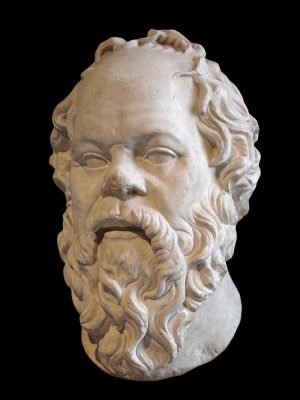The ancient Greek philosopher, Socrates, did not hold traditional beliefs about gods. His uncommon view of the gods came into conflict with those of the prevailing beliefs during his time. The worship of gods in ancient Greece was not organized, and ceremonies were held for particular gods. Furthermore, there were no holy scripts. Although Socrates was charged with impiety, scholars are uncertain whether Socrates was a believer or a non-believer.
Much of Socrates’ views on religion can be found in the dialogues written by Plato, such as Euthyphro, Apology, and Alcibiades. Socrates states in Alcibiades that anyone who sees wisdom in his soul will come to know the divine and will then acquire precious knowledge about himself. His opinions about religion are inseparable from his rational temperament. This becomes clear in Euthyphro, where he believes that offering sacrifices to the gods will not gain you anything, particularly if you are asking for something in return for your offerings. This single view alone casts him apart from the prevailing belief during his time, as sacrifices were common and taken for granted in ancient Greece. Unexpectedly, his views were not destined to be popular. Instead of sacrifices as a form of reverence, he proposed learning and the study of philosophy as the way to worship the gods. To Socrates, the way to religious ecstasy is through self-knowledge and not through the customary ways of reverence, which are rooted in self-interest anyway.
In Euthyphro, he questions the gods and the nature of goodness. He asks whether the gods love a good deed because it is good, or is it a good deed because the gods love it? Socrates held that goodness is good regardless of what the gods think of it, and therefore the gods themselves must favor goodness.
In Plato’s Apology, which chronicles Socrates’s trials, Socrates makes it known that he believes in gods when he says he acknowledges the gods more than those who accuse him. Based on how Plato depicts Socrates, the presence of gods is assumed. Socrates never carried on a dialogue that centered on whether gods existed or not. However, Socrates can also be viewed as an agnostic, based on his discussion in Apology, where he expressed the unknown that follows death. In Phaedo, which centers on the human soul and follows the philosopher’s last days, Socrates lays down his belief in the immortality of the soul using four arguments. Socrates may not have believed in offering sacrifices to the gods, but he believed in divination and oracles. He did not associate these with his views on moral concerns but only with foreseeing untoward events in the future.
In Memorabilia, a collection of Socratic dialogues written by Socrates’ student, Xenophon, Socrates discusses the intelligent design argument. He states that since many aspects of the universe indicate that the world was planned, this world must have been planned by a superior, creative being. Following this, he reasoned that this superior being has unlimited knowledge and unlimited power and that this all-knowing and all-powerful being created the world specifically for the betterment of humans. He believed that humans have a special place in the universe since they have many capabilities that other animals do not possess.
Another perplexing trait of Socrates, as these dialogues represent him, was his habit of switching between the terms “god” and “gods.” Scholars believe that he did this because he believed that a superior god governed other gods or that there were several gods, but all were parts of a single, powerful being.
Socrates’ rationalism is thoroughgoing and meticulous, as characterized by his method of asking relentless questions to arrive at the truth. This aspect baffles modern scholars who try to harmonize his rationalism with his religious beliefs.
